A federal court has ruled that a Pennsylvania community’s resolution prohibiting the display of an American flag with a thin blue line on all township property is unconstitutional. The ruling about the flag that’s also used as part of the police union’s logo came down Nov. 13.
The dispute in Springfield Township, about 15 miles from Philadelphia, arose over the use of the black-and-white American flag, with one horizontal blue stripe. The township argued the flag was creating “discontent and distrust” in the community against the police.
But prohibiting the use of the thin blue line flag restricts the free speech of public employees under the First Amendment, U.S. District Judge Karen Marston decided.
“The Township repeatedly suggests that the Thin Blue Line American Flag is of limited, if any, public value or concern because it is ‘offensive’ and ‘racist,'” Marston wrote in the court opinion. “But as this Court previously told the Township, ‘the First Amendment protects speech even when it is considered “offensive.”‘”
Wally Zimolong, an attorney representing the police officers, said the court’s ruling was a vindication of his clients’ claims.
“It was a resounding win for the First Amendment and free speech,” he said. “It showed once again that the government cannot engage in viewpoint discrimination based upon a message it disagrees with or finds offensive.”
Messages left with the township and their attorney seeking comment were not immediately answered.
Tensions began when the township police department’s union voted to incorporate the flag into its logo in 2021. Several of the township’s commissioners opposed the decision, due to the fact the symbol has become associated with Blue Lives Matter, a term used by some police supporters in response to the Black Lives Matter movement.
Commissioners and the police union met to discuss the logo, but the union voted to deny the request to change it. The township offered to cover the cost of designing a new logo — saying a private donor had agreed to pay up to $10,000 to change it — but the union declined.
In October 2022, the matter escalated when the township’s lawyer and manager sent a cease-and-desist letter to the union, saying that the use of the flag in the union’s logo “unnecessarily exacerbates the ongoing conflict between police officers and the communities they serve,” directing the union to stop using the flag or remove Springfield Township from its name.
After the union refused to drop the flag or change its name, the commissioners adopted a policy that barred township employees, agents or consultants from displaying the flag while on duty or representing the township. It prohibited the display of the flag on personal property brought into a township building or from being displayed on township-owned property, including vehicles.
The police officers who brought the lawsuit, along with the statewide police union, argued that the flag is a “show of support” for law enforcement, representing “the preservation of the rule of law, the protection of peace and freedom, the sacrifice of fallen law enforcement officers and the dedication of law enforcement office(r)s,” according to the court opinion. They argued they wanted to continue to display the flag in township buildings and publicly.
The court sided with the officers, saying that the township failed to demonstrate “real, not conjectural, harm” by using the flag and that the ban “addresses that harm in a direct and material way.”
In the opinion, Marston remarked that for the township to call the flag “racist” and “offensive” “at times borders on unprofessional.” Morale in the police force, she said, appeared to have taken a “significant toll from the repeated assertions that the police officers — and not merely the Flag — are racist.”
“Nevertheless, it is undeniable that the Flag carries racist undertones to certain members of the community,” she wrote in denying a request to impose sanctions on the township. “Indeed, the individual Plaintiffs admitted that they have been told the Flag carries racial undertones.”
Brooke Schultz is a corps member for the Associated Press/Report for America Statehouse News Initiative. Report for America is a nonprofit national service program that places journalists in local newsrooms to report on undercovered issues.
The Free Speech Center newsletter offers a digest of First Amendment- and news media-related news every other week. Subscribe for free here: https://bit.ly/3kG9uiJ

